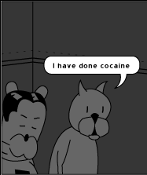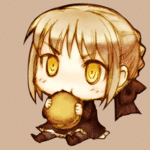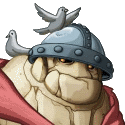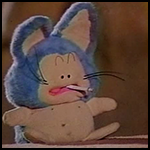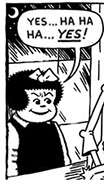|
They are not really that -much- worse. Sorcerers can still use wands/scrolls that are on their spell list, even if they don't know the spells. They're generally a level behind on the 'now I have the good stuff' breakpoints, so by the time the sorcerer gets fireball a wizard's been using it for a couple of adventures. That was the first issue. The other is that the designers -really- over-valued spontaneous casting as a thing, so the sorcerer was basically "Wizard who gets the good spells slower and doesn't get bonus feats."
|
|
|
|

|
| # ? Apr 27, 2024 02:50 |
|
Yeah, since Sorcerers don't get bonus feats, you have zip, zero, nada reason to stay Sorcerer when you can take a level in a prestige class that gives full spellcasting. I believe the only thing you lose out on is your familiar becoming slightly more potent.
|
|
|
|
Evil Mastermind posted:At the risk of sounding whinily un-satisfy-able, LL and Dark* Dungeons are good retroclones and recreate one of my favorite versions of D&D (hell, it's the edition I started with), but the problem I always end up having is that they're so dry. They're not trying to do anything new, or present an expected playstyle, or draw inspiration from anything but the old core rules. They're just rules that, admittedly, I already own. The stranger modules you mentioned before were run with the boring old rules. The strange and unusual stuff only got added in the modules. So in something like Expedition to Barrier Peaks you just get the sci fi stuff added to the core rules. Apparently people don't want to write modules of that type. Also I don't remember stuff like, "Awesome Pecs and Hair", "stab enemy with its own weapon" "your wizard's power is tied to the intricacy of his tattoos" showing up when I played early editions of D&D. DocBubonic fucked around with this message at 19:18 on Jun 10, 2015 |
|
|
|
DocBubonic posted:Also I don't remember stuff like, "Awesome Pecs and Hair", "stab enemy with its own weapon" "your wizard's power is tied to the intricacy of his tattoos" showing up when I played early editions of D&D. They showed up in D&D-inspired stuff, though, is what I'm saying. That's the stuff that inspired me more as a kid than the stuff in Appendix N, which neither me or my friends ever read. It's a bit of a moot point anyway, because I just remembered that an upcoming Fate release is "Masters of Umdaar", which flat-out states taking inspiration from stuff like He-Man, Krull, and Kamandi, so I guess I just have to wait about a month or so for the prettied up version.
|
|
|
|
Evil Mastermind posted:They showed up in D&D-inspired stuff, though, is what I'm saying. That's the stuff that inspired me more as a kid than the stuff in Appendix N, which neither me or my friends ever read. Too bad no OSR people want to go in that direction because that sounds like fun.
|
|
|
|
There is definitely cool stuff under the broad label of OSR. My favourite, honestly, is probably the job that Goblinoid Games did on Labyrinth Lord and Mutant Future--Mutant Future reconciles all the old editions of Gamma World into one game that's compatible with Labyrinth Lord. Put robots and laser guns into your D&D game to your heart's content.
|
|
|
|
DocBubonic posted:Too bad no OSR people want to go in that direction because that sounds like fun. There's a ton of stuff like that available for the Dungeon Crawl Classics RPG actually(one of the reasons it's one of my favorite games in the OSR movement)
|
|
|
|
Speaking of gonzo OSR stuff, there's at least Anomalous Subsurface Environment which is apparently an old school science fantasy module.
Ratpick fucked around with this message at 22:26 on Jun 10, 2015 |
|
|
|
gradenko_2000 posted:3rd/3.5E question: from what I gather, it was really hard for the Wizard to actually get enough spells in AD&D to really become the powerhouse that they're generally regarded as, so the Sorcerer was supposed to be a sort of deal-with-the-devil: you could have a lot of freedom with what spells you learned, because you learned them naturally and you could pick and choose from the book, and you could spent your slots on any given spell you knew, but in exchange, you'd never be able to learn as many spells as a Wizard The sorcerer wasn't added in to make spells easier, since 3.x tacked hard into making being the wizard as easy as possible. Instead, it was meant to be a wizard who traded versatility and planning for power and spontaneity. The wizard can know all the spells while the sorcerer gets like four each level, but the sorcerer can cast more spells then the wizard, and never has to worry about casting the wrong spell when they needed it later. What ended up undermining this immediately was that, par the course, wizards got both those benefits almost immediately, and the developers dramatically overestimated the power of spontaneous casting. A specialist wizard has one additional spell per spell level, meaning they're only one spell/day/level behind the sorcerer. A wizard could leave spell slots blank after resting, and add spells throughout the day as they adventured. These two alone pretty much took out a good chunk of the sorcerer's advantages, and then proceeded to poo poo all over it's weaknesses; sorcerers had to spend a full round in order to use metamagic, got no bonus feats, and gained new spell levels later then wizards. This gap became even wider as book after book after book introduced not only new spells - every new spell was another thing wizards could put into their spell book(s) no problem, but sorcerers were still stuck with having like 5 spells known each level. Things proceeded to get even worse as each new book also introduced new PrCs, and every spellcasting PrC had "can cast x level spells" as a requirement, meaning wizards could get into them before sorcerers. Basically the designers a) didn't know what they were doing, b) totally forgot sorcerers even existed not long after making them, and c) and were too busy fellating wizards.
|
|
|
|
So some people a while back mentioned movement in 2e D&D being different from what came after, and being able to spend your movement out-of-turn in particular. Can anyone tell me how that worked? Could you just follow someone around and always be next to them no matter what?
|
|
|
|
Evil Mastermind posted:At the risk of sounding whinily un-satisfy-able, LL and Dark* Dungeons are good retroclones and recreate one of my favorite versions of D&D (hell, it's the edition I started with), but the problem I always end up having is that they're so dry. They're not trying to do anything new, or present an expected playstyle, or draw inspiration from anything but the old core rules. They're just rules that, admittedly, I already own. Sounds like you need to grab some people from The Piazza and start a retro-supplements hobby. quote:Also I don't remember stuff like, "Awesome Pecs and Hair", "stab enemy with its own weapon" "your wizard's power is tied to the intricacy of his tattoos" showing up when I played early editions of D&D. One of my favorite BECMI books describes a Kopru who goes on at length about how Mystara is full of NERDS and then goes on to give you rules to play a Kopru. This is a Kopru: 
Mormon Star Wars fucked around with this message at 06:07 on Jun 11, 2015 |
|
|
|
Jimbozig posted:So some people a while back mentioned movement in 2e D&D being different from what came after, and being able to spend your movement out-of-turn in particular. Can anyone tell me how that worked? Could you just follow someone around and always be next to them no matter what? The combat resolution in the PHB sounds bog-standard, at least relative to pre-3E D&D. What you're describing is in the Player's Option - Combat and Tactics book: You choose between a No-Move Action, a Half-Move Action and a Full-Move Action. If it's a No-Move Action, you can do all of the traditional combat actions such as attacking, casting spells, etc., but you don't move, except you also get a free "one square adjustment" that doesn't draw Attacks of Opportunity (hey! that's where 3E's five-foot-step comes from!). If it's a Half-Move Action, you can move up to half your speed, but you cannot cast spells, firing ranged weapons is at half the rate of fire, and you cannot parry nor use magical items. If it's a Full-Move Action, you can move your entire speed, but you can only Charge (which is movement ending in an attack), or Move, or Run, or Sprint. Finally, you can still change your declared action after everyone else has declared theirs, but it will be last at the initiative count. And then when it's time to execute all of the declared actions, they're done in two Half-Move phases each, in order of initiative, such that movement is staggered and the state of the battlefield can change half-way through your turn (hence the ability to declare a new action, provided you're willing to go last) I'm probably mangling it a bit, because I'm just reading through it now and the execution is rather complex, but suffice it to say that the temporal mechanics described in the book are far more stutter-step than 3E and later. EDIT: Cirno probably explained it better, and what he said is in the raw PHB gradenko_2000 fucked around with this message at 07:56 on Jun 11, 2015 |
|
|
|
Plus, there was also Skip Williams at WoTC, who hated the idea of sorcerers, sabotaged them to make them worse, and after his erroneous Sage Advice during 3.0e column saying Sorcerers couldn't use Quicken Spell for some really rules-lawyer-y and false reasons (lengthened time of casting, and him misunderstanding the difference between a full-round action and an action lasting a full round) was widely disparaged he then hardcoded his bad ruling into 3.5e if I remember correctly. The bizarre pettiness of some game designers continues to astound me. (Or when they put a class/splat in the hands of someone who utterly loathes the mechanical underpinnings of it.)
|
|
|
|
Jimbozig posted:So some people a while back mentioned movement in 2e D&D being different from what came after, and being able to spend your movement out-of-turn in particular. Can anyone tell me how that worked? Could you just follow someone around and always be next to them no matter what? The non-shorty races have movement rate 12, the shorties have movement rate 6. In combat, you can move ten times your movement rate in feet (since remember, each combat round is a minute, not 6 seconds like it becomes in 3e). You can move half that distance and still attack in melee. Archers can move half their distance and still pew pew, but only at half fire rate. Charging lets you move 50% more and gives +2 to attack (which in 2e is a big deal, as bonus modifiers are much more rare) but they take penalties to initiative, AC, and a defender who propped up their polearm does double damage. If you're in melee and you wanna get out, you can either withdraw (move 1/3 your speed, but your enemy can move right alongside you unless you have an ally also fighting them), or flee outright. Fleeing lets you use your full movement rate, but the enemy gets a free attack on you, and again, the enemy can simply chase you unless you have an ally to block them.
|
|
|
|
gourdcaptain posted:Plus, there was also Skip Williams at WoTC, who hated the idea of sorcerers, sabotaged them to make them worse, and after his erroneous Sage Advice during 3.0e column saying Sorcerers couldn't use Quicken Spell for some really rules-lawyer-y and false reasons (lengthened time of casting, and him misunderstanding the difference between a full-round action and an action lasting a full round) was widely disparaged he then hardcoded his bad ruling into 3.5e if I remember correctly. The bizarre pettiness of some game designers continues to astound me. (Or when they put a class/splat in the hands of someone who utterly loathes the mechanical underpinnings of it.) To me is one of the major 3.x legacies, which of course was continued into Pathfinder. Making classes someone hated, who was then given full power to sabotage them as much as they so desired. You get a REAL good look at how "professional" this hobby is when the biggest name in the industry acts like this.
|
|
|
|
gourdcaptain posted:Plus, there was also Skip Williams at WoTC, who hated the idea of sorcerers, sabotaged them to make them worse, and after his erroneous Sage Advice during 3.0e column saying Sorcerers couldn't use Quicken Spell for some really rules-lawyer-y and false reasons (lengthened time of casting, and him misunderstanding the difference between a full-round action and an action lasting a full round) was widely disparaged he then hardcoded his bad ruling into 3.5e if I remember correctly. The bizarre pettiness of some game designers continues to astound me. (Or when they put a class/splat in the hands of someone who utterly loathes the mechanical underpinnings of it.) A lot of what goes on in legacy RPG products where it's more than one guy making his own game but multiple people working on a project, especially if that project goes on to multiple editions, reminds me a lot of the poo poo that goes on in American superhero comics, where one person can spend months or years writing something out only for the next guy in line to go "no this is dumb and sucks, check this out" and immediately proceed to set about dismantling or undermining what came before. e; which isn't to say that putting a new spin on things is always bad, sometimes it's quite good and reasonable, but it's not too hard to figure out which stuff is the result of someone just looking to put their own spin on things and which stuff is the result of petty feuds and grudges.
|
|
|
|
From a video game perspective it reminds me of WoW's Holy Priests having the Lightwell ability for years and years and years because one of the devs' main characters played one. People always suspected that it was their baby.
|
|
|
|
I have sort of an odd question but bear with me for a second. Imagine a fantasy race that, upon giving birth, produces four to six younglings at a time. How would inheritance work? It doesn't make sense for there to be primogeniture, since the firstborn pretty much came up at the same time of his brothers and sisters. But on the other hand it's not feasible to split it amongst the brood, especially for the poorer classes. At a more basic level, is such a thing even possible? Would it strain the mother's body too much to generate so many children? There are animals that produce much more offspring but I am not sure if the same concept can be applied to humanoid races.
|
|
|
|
That is definitely...detailed. As far as the biological possibility. It's absolutely possible, women have given birth to as many as 8 live babies at once (although the survival rate would be very low without advanced scientific medical aid or magic). That said, the reason humans tend towards single children at once is that we have long gestation periods and we are (relatively) large animals. Most bigger animals give birth to single young because the gestation time is longer for larger infants and carrying multiples would be an evolutionary disadvantage. That's not even accounting for our extremely long infancy compared to other animals. Any human-sized animal that gives birth to many young would have to have extremely small, and thus underdeveloped, young. Basically like premature births in humans...and the survival rates on those aren't great. If they developed outside of the body (say in the form of eggs) then that might work. Socially, it could work any number of ways. They might have a pack mentality where each group of sextuplets must find some way to show dominance over their siblings and the "alpha" sibling inherits. Alternatively there might be some sort of "proving" or "adulthood" ceremony and the first child to complete it is considered to be the "first born" for purpose of inheritance. Of course, keep in mind that you either end up with most children getting nothing (becoming hobos or dependent on the fortunate sibling) and you're likely to end up with a very high mortality rate...the sheer difficulty of raising 6 infants simultaneously, especially in a pre-modern society, is going to mean that at least some get killed. Or the parents just lack the resources to care for that many at once.
|
|
|
|
paradoxGentleman posted:Imagine a fantasy race that, upon giving birth, produces four to six younglings at a time. Mortal combat
|
|
|
|
paradoxGentleman posted:I have sort of an odd question but bear with me for a second. Dunno why they have to be humanoid, but I'll take a stab at it. In several species of animals that have multiple births, the young will sometimes eat each other, so only the strongest of them survive. You could sorta adapt this in a way so that inheritance is merit-based. The children would have to prove themselves to their mother, either through some culturally-constructed method that establishes worth, or alternatively by actually killing their siblings if you're looking for a more sadistic take. Actually, no matter how you slice it, this system would be pretty awful to live in. I guess they could divide their children up into different careers/classes on birth, perhaps in order of emergence/hatching/etc or by some other system. One to the laboring class, another to the priesthood, another to the warriors etc. Bring astrology into it, and perhaps children born under a certain sign are assigned in reverse order or get split up into special classes. Obviously this is a more rigid culture, and the more I think about it the more it reeks of homogenity, but there could be schisms that do things differently, perhaps with different assignments. There's a lot of character potential there in the sense of people who feel they don't fit into their assigned class and leave to pursue a different trade. Or if you wanted something even more out there, alter the idea of inheritance. The siblings are a team, like a pack, and they inherit their parents' stuff collectively. They spend their lives together and work together as part of a larger social group like their village or town. When they pair off with other packs (or who knows? Nothing says they only need 2 people to reproduce, could be more), the two packs they come from contribute resources to the new offspring. If you're willing to think of resources less as "cash/food/goods" and more like "services" this could include intangible things like teaching the new pack trade skills or imparting knowledge of the world/magic/science/folklore etc.
|
|
|
|
Serf posted:In several species of animals that have multiple births, the young will sometimes eat each other, so only the strongest of them survive. You could sorta adapt this in a way so that inheritance is merit-based. The children would have to prove themselves to their mother, either through some culturally-constructed method that establishes worth, or alternatively by actually killing their siblings if you're looking for a more sadistic take. Actually, no matter how you slice it, this system would be pretty awful to live in. The team idea, on the other hand, ties in nicely with the concept of adventuring parties...
|
|
|
|
Elective Gavelkind *shudders*
|
|
|
|
My Lovely Horse posted:With a high infant mortality rate I'd assume the foremost qualifier to inherit would be surviving your own birth and infancy to begin with. The children later making attempts at each others' life to improve their own lot would only be a natural extension of that. Such a thing might well be perfectly acceptable in this society, since everyone went through the same thing. I could even imagine there would be a stronger kinship between siblings from different litters - your littermates are competition, your other siblings are fellow survivors deserving of respect. I have this notion that (if we're gonna stick with the idea of widespread economic inequality) that the poorer classes would have to deal more with natural death and early "winners." Whereas the richer classes could afford to feed and raise more of their offspring and the competition becomes a sick spectacle, with the parents mentoring and outfitting their children to better kill each other and prove their "worth" through ritual combat. Or in a more anarchic version, assassinations and public killings would be the order of the day. Maybe you do it as loud and bloodily as possible to instill fear in your siblings, who could opt out by giving up their claim to the inheritance or accepting ostracism from society. Or maybe murdering your siblings is illegal and the whole point of the affair is to off them in the most subtle and deniable manner, and evading conviction by law enforcement is what really proves your worth.
|
|
|
|
One time I read about how pregnant Aztec women would garb themselves in full battle dress during childbirth, and if they died during it this was considered their version of dying on the battlefield and they were buried with appropriate honors. Then I came up with this whole thing where the world was a resting spot for souls. We came from somewhere else to be born and when we die, we continue our journey. Demons haunt the edges of our world and seek to devour the weary souls that are just arriving. Women in childbirth would partially cross over to the Otherworld and fight off the demons so the souls could make it through and be born. Always thought that'd be cool to drop in as a detail somewhere. Also thing to remember is that human/ape children are resource intensive as all get out. We're literally born underdeveloped compared to other mammals because our heads wouldn't be able to get out otherwise. Eggs would probably be the way to go in this situation.
|
|
|
|
oriongates posted:That is definitely...detailed. One of my favorite things to do when worldbuilding is take a biological or metaphysical fact and try to work out the effect it would have on society. For example, I imagine at least some reptile civilizations would not consume eggs, since their own children come from eggs and it would sort of gross them out. Serf posted:Or if you wanted something even more out there, alter the idea of inheritance. The siblings are a team, like a pack, and they inherit their parents' stuff collectively. They spend their lives together and work together as part of a larger social group like their village or town. When they pair off with other packs (or who knows? Nothing says they only need 2 people to reproduce, could be more), the two packs they come from contribute resources to the new offspring. If you're willing to think of resources less as "cash/food/goods" and more like "services" this could include intangible things like teaching the new pack trade skills or imparting knowledge of the world/magic/science/folklore etc. This is the idea I like best, mostly beacuse it makes sense without it being too animalistically violent, which is great for civiliation building. Depending on what they inherited from their parents, each "pack" of siblings make their way into the world, depending on one's particular talents. If four of them inherit a mill, for example, the two strongest ones can pull the grind, the handy one makes repairs and upkeeps the machinery and the scholarly one keeps track of the bookkeeping. But with such a society I get the feeling that the need for a traditional family unit would not be felt as strongly. Maybe they only mate and stay together long enough for their prole to become self-sufficient, then gift them what is necessary to make their way in the world and go back to their sibling pack. When the last member of a rich pack dies, I imagine there would be a race for their children to get there to lay claim to their parents' and uncles' riches. paradoxGentleman fucked around with this message at 14:47 on Jun 11, 2015 |
|
|
|
I was talking to a friend about how new Scion actually looks preyed cool and actually playable and he asked me about the premise and when I said he was like "That's sounds more Percy Jackson than American Gods" and I got pretty bummed.
|
|
|
paradoxGentleman posted:I have sort of an odd question but bear with me for a second. Hey, this is about as many pups as wolves give birth to at a time. So let's look at wolf social structures. Wolf packs generally consist of a breeding pair, the latest litter of pups, and a couple yearlings. When the pups grow old enough to compete with mom and dad for food, they generally disperse, find a mate, and start their own pack. Male wolves unable to find a mate will sometimes reproduce with female wolves that haven't dispersed yet, but without the pair-bonding that normally occurs. Orphaned pups and the occasional yearling are often adopted by other packs. So one way of doing things might be that 1. inheritance is conducted at the level of birthings rather that of individuals and 2. ultimogeniture is the norm- the last birthing gets mom and dad's stuff to divide among themselves. Of course, wolves don't experience menopause, and so if your fantasy race does, this will be somewhat different and so will the social structure. In addition, they would presumably control their fertility and have less children than wolves do. Of course, this has some broader implications for social structures, since extended households would be rare and the commonality of those is an important part of how human societies developed in the fashion they did historically.
|
|
|
|
|
Adult siblings competing directly just doesn't make evolutionary sense to me. If your kids get to adulthood, you don't want them murdering each other. If anything you want them out murdering other people's kids. Instead, consider a society centered around something like a lion's pride. There's a lot of room there to create cultural variety. You could have one culture that views females as property and another where females can change prides at will and even take a share of pride property with them. In XYZ, it could be open season on killing any adult male, but ABC has laws protecting subordinate males and giving them a place in society. Etc etc.
|
|
|
|
paradoxGentleman posted:This is the idea I like best, mostly beacuse it makes sense without it being too animalistically violent, which is great for civiliation building. I think this sidesteps the problem, because it doesn't really make sense for what happens in the generation afterwards. There's parents, they have six kids, those six kids jointly inherit a mill. But then what happens when those six kids want to have kids? Do you end up with 36 kids who will inherit the mill the generation after that? Does only one of the six get to have kids, and the rest of the siblings aren't permitted to/have to leave and give up their inhereitance in order to do so? That would be one way to make the society stable without introducing an absolutely staggering mortality rate, at least.
|
|
|
|
You know if you have 6 kids there's a good chance that at least three DON'T WANT YOUR loving MILL DAD I"M GOING TO BECOME A BLACKSMITH AND YOU CANT STOP ME!
|
|
|
|
If this species lives as long as humans do (say 70 years for those that make it to maturity and have decent nutrition), then in order to avoid overpopulation, either they abandon newborns or they have a very limited fertility cycle, such that they can reproduce, say, once every four or five years, or we could make them purely Secondary World (in Tolkien terms) and ignore natural evolution and just have them practice extreme contraception. Or they live five-six years like wolves do. Interesting, mice appear to have an inverse correlation between lifespan and litter sizes, such that long-lived strains of mice produce fewer children.
|
|
|
|
|
I would probably go with the whole Red Martian egg laying thing for births, and go all Roman Emperor on inheritance. The parent picks the heir, and various events may entice the parent to pick another heir, possibly even an adopted child. This fosters competition for the children who may or may not feel compelled to off each other, but who always feel the need to watch their back. The Heir is generally expected to care for the rest of his or her siblings after inheritance, but this again really depends on the general proclivities of the chosen heir.
|
|
|
|
RPZip posted:I think this sidesteps the problem, because it doesn't really make sense for what happens in the generation afterwards. There's parents, they have six kids, those six kids jointly inherit a mill. But then what happens when those six kids want to have kids? Do you end up with 36 kids who will inherit the mill the generation after that? Does only one of the six get to have kids, and the rest of the siblings aren't permitted to/have to leave and give up their inhereitance in order to do so? That would be one way to make the society stable without introducing an absolutely staggering mortality rate, at least. Maybe it takes more than a binary pair to produce 6 children? Could take 3, could take the whole 6. Instead of 36 kids you wind up with 1 litter of 6 to replace the original 6 or more realistically you do it twice and wind up with 12, to ensure a reasonable rate of expansion. Or there are other things, like maybe a set number of offspring are always sterile or there is a low rate of conception. Childhood mortality via disease or other factors could account for fewer making it to adulthood. The idea of a species that gives birth to 6 offspring at a time but only 2 are fertile is pretty cool.
|
|
|
|
one could go with the solution that pops up with Goblins, who often are noted as being given to Multiple Births, which is varying degrees of Communal upbringing, also races like this usually are R-Selection specialists, compared with Human's K-Selection strategy so that's also something to keep in mind
|
|
|
|
Mormon Star Wars posted:Sounds like you need to grab some people from The Piazza and start a retro-supplements hobby. I've been wanting to write a supplement for Dark Dungeons for years to cover all the additional races and classes that BECMI D&D added in it's expansions(and maybe some new ones as well), but I don't have the skills needed for such a thing(although I'd be glad to help anyone who would want to tackle such a project)
|
|
|
|
This year's Game Chef has begun.quote:The theme for Game Chef 2015 is: A Different Audience
|
|
|
|
Evil Mastermind posted:This year's Game Chef has begun. The only way this will be good is if they go full Sweet Genius and halfway through the game development they press a buzzer and go "Also the game has to be reminiscent of the concept of lens cleaner" or something.
|
|
|
|
As some of you are aware, the Pathfinder Online MMO launched to our faithful Kickstarter backers back in January and they’ve been helping us bring the world of the River Kingdoms to life! And now you too can join in on these adventures! This is the perfect opportunity to get involved with Pathfinder Online and continue to help us craft a game that will entertain for years to come! The developers at Goblinworks constantly interact with the Paizo and Pathfinder communities and are implementing their feedback on a regular basis. This is your chance to get in on the ground floor and make your mark on the game and in the River Kingdoms. This style of MMO needs players to craft the world, build settlements, create alliances, and shape the game so come and be a part of something very special. Jump into the game today with a FREE 15-day trial account and help change the River Kingdoms forever!
|
|
|
|

|
| # ? Apr 27, 2024 02:50 |
|
Someone sign up for this and loving stream it.
|
|
|







